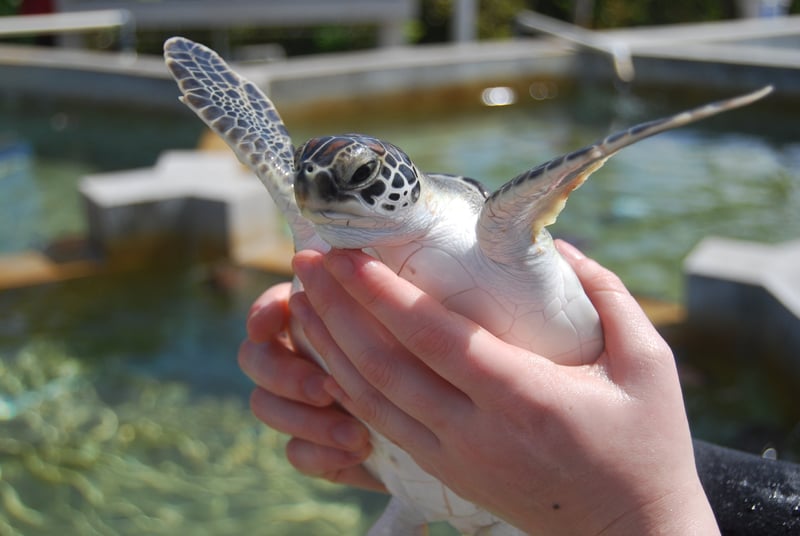
Cayman turtle farm endangers wild turtles
News
The Turtle Farm’s renewed wild release program is a ticking time bomb for turtles across the world.
The Cayman Turtle Farm is placing wild turtle populations in jeopardy by resuming its controversial ‘wild release program'.
The venue released 15 yearling green sea turtles on Saturday, May 21 off Barkers Beach in West Bay.
The Farm was forced to suspend its controversial wild release program in 2013 following problems with disease and other poor husbandry issues at the facility. We first raised public concerns about the Farm’s release program in 2012.
Officials said the Turtle Farm had “satisfied itself through extensive testing and available scientific data” and that releasing the turtles “would not pose any medical risk to wild turtle populations”. However, in 2015 the Farm tried to deliberately cover up the deaths of more than 1,000 turtles, caused by a disease outbreak, despite the threat it posed to public health.
“The Turtle Farm resuming its release program is a ticking time bomb for wild turtles in the Caribbean and around the world," said Dr. Neil D’Cruze, Head of Wildlife Policy and Research at World Animal Protection,
“It is staggering that the Turtle Farm has decided to resume its controversial release program. The facility has a phenomenally poor record of caring for turtles, demonstrated by the 1,268 turtles that died from a Clostridium outbreak in 2014. It is incomprehensible that they appear to be allowed to make this decision for themselves.”
“We are bitterly disappointed that the Cayman Islands Government has not stepped in to prevent these releases from taking place, or for even informing us that they would happen, despite our previous agreement to maintain dialogue.”
A host of different diseases have been repeatedly identified in the overcrowded, stressful conditions of the Farm. Last year’s Clostridium outbreak was a stark reminder of the disease risks posed by the Farm. Diseases that could be passed on to wild populations via the release of farmed turtles into the wild.
Related: 5 surprising facts about turtle cruelty happening today
Since it was first opened in 1968, the Farm claims to have released more than 31,000 captive-bred sea turtles back into the wild. However, according to the Department of the Environment figures, only 200 green sea turtles are currently nesting on Caymanian beaches.
D’Cruze added: “Even if all 200 sea turtles nesting in Cayman originated from the Farm, this represents only 0.006% of their 31,000 releases. At best this is a poor use of sea turtle conservation dollars, at worst it is spreading deadly diseases to wild populations”.
The Farm costs the public purse more than $9 million per year in paying off debts and low gate receipts. World Animal Protection is calling for the Farm to end its controversial wild release program and use the available funds to invest in more cost-effective methods to protect wild turtle populations, such as increasing anti-poaching efforts.
“It is staggering that the Turtle Farm has decided to resume its controversial release program. The facility has a phenomenally poor record of caring for turtles, demonstrated by the 1,268 turtles that died from a Clostridium outbreak in 2014. It is incomprehensible that they appear to be allowed to make this decision for themselves.